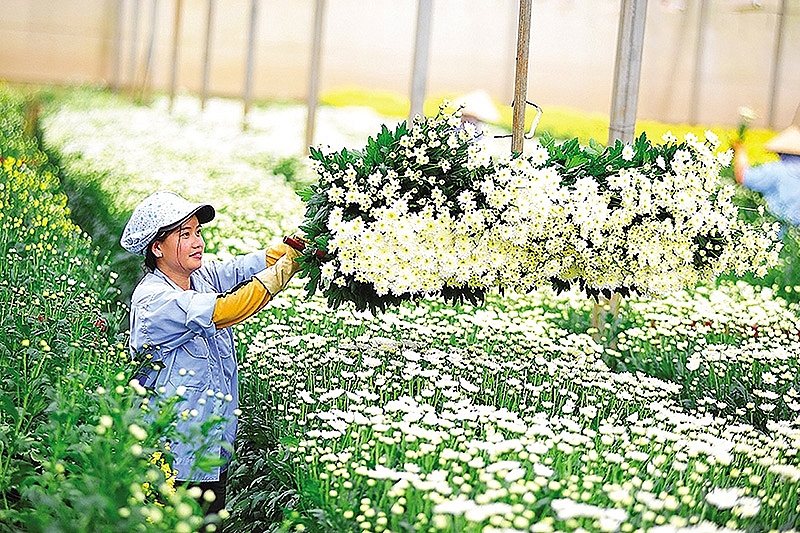Smart agriculture to be aided by PPP
 |
| Vietnam’s agricultural sector is in the process of being modernized |
A group of local and international bodies from the fields of agriculture, commerce, and trade last week signed a joint statement on pledging to continue supporting the Vietnamese government in realising the sustainable development of its agricultural sector, with new products and training programmes for farmers.
The signatories include EuroCham, EU-ASEAN Business Council, US-ASEAN Business Council, AmCham, the Hanoi Agriculture Chemical Association (representing 48 companies based in Hanoi which produce and trade agricultural chemical products), the Vietnam Pesticide Association (representing 62 local companies which produce and trade agricultural chemical products in Vietnam), and CropLife (representing global leading agriculture developers, including Arysta, BASF, Bayer, Corteva, Dow-Dupont, Sumitomo, and Syngenta).
“The industry takes its responsibility seriously and offers its commitment and support to help the government achieve its food safety objectives. This includes continuing to research the development of alternative natural products, to promote the responsible use of crop protection products in the Vietnamese agricultural sector, as well as providing a scientific and international-standards-based approach towards achieving the government’s objective of a 30-per-cent reduction of product registrations by 2021 without sacrificing the sustainability and competitiveness of Vietnam’s agriculture,” said the joint statement.
Prime Minister Nguyen Xuan Phuc recently called for the Vietnamese agricultural sector to become one of the 15 most developed in the world in 10 years and utilise scientific and technological advances. He stressed that more innovation is needed to generate new drivers for growth and to ensure macro-economic stability.
Actually, unleashing the potential of modern agriculture to support sustainable, inclusive development requires enormous investment, collaboration, and a stable policy and regulatory environment. All three factors are critical to allow Vietnam to harness cutting-edge technology to accelerate its development, according to the statement.
In agricultural production, crop protection tools like pesticides play a critical role in producing more food using fewer resources.
The Ministry of Agriculture and Rural Development (MARD) committed that it would continue to seek co-operation with more foreign partners to develop the agricultural sector through public-private partnerships (PPP) and to reach the agricultural export turnover of over $40 billion per year in the future.
Last week, MARD Minister Nguyen Xuan Cuong met with representatives of Croplife Vietnam and the US’ Archer Daniels Midland Corporation (ADM) to find trade and investment co-operation opportunities in animal feed under the PPP model. In Vietnam, ADM is involved in the import, export, and local distribution of grains, oilseeds, oilcakes, and feedstuff, feed ingredients and additives, food ingredients, vitamins and dietary supplements, and flavourings.
“If we want the agricultural sector to develop sustainably, we must expand the PPP model,” Cuong said.
In fact, over the past decade, the agricultural sector has been conducting PPP in seven product categories, including coffee, tea, fruit and vegetables, fish, spices and pepper, rice, and agricultural chemicals. The PPP model has drawn in many big names, such as Nestlé, Syngenta, Bayer, BASF, Cisco, EDE Consulting, Dakman, Sara Lee, Unilever, PepsiCo, Cargill, and Yara.
“In the near future, we will continue expanding PPP with many more foreign partners, with a focus on developing three lines of key products: 10 national-level products with the annual export turnover of over $1 billion, provincial-level products, and locality-level products,” said Deputy Minister of Agriculture and Rural Development Le Quoc Doanh. “Over the past years, agricultural PPP projects have made major successes.”
For example, businesses in the tea-oriented PPP group have invested EUR440,000 ($514,000) into connecting production models and training over 23,000 farmers and many local producers. In another case, the coffee-oriented PPP group has developed 256 model gardens and three PPP co-operatives in the Central Highlands region. This has benefited 130,000 hectares of coffee (20 per cent of Vietnam’s total coffee plantation area), with farmers’ average income rising by 14 per cent.
The agricultural sector reaped an export turnover of $36.37 billion last year, up 13 per cent against 2016. The figure was $25.7 billion in the first eight months of this year, up 7.3 per cent against the same period last year.
What the stars mean:
★ Poor ★ ★ Promising ★★★ Good ★★★★ Very good ★★★★★ Exceptional
 Tag:
Tag:
Related Contents
Latest News
More News
- Foreign leaders extend congratulations to Party General Secretary To Lam (January 25, 2026 | 10:01)
- 14th National Party Congress wraps up with success (January 25, 2026 | 09:49)
- Congratulations from VFF Central Committee's int’l partners to 14th National Party Congress (January 25, 2026 | 09:46)
- 14th Party Central Committee unanimously elects To Lam as General Secretary (January 23, 2026 | 16:22)
- Worldwide congratulations underscore confidence in Vietnam’s 14th Party Congress (January 23, 2026 | 09:02)
- Political parties, organisations, int’l friends send congratulations to 14th National Party Congress (January 22, 2026 | 09:33)
- Press release on second working day of 14th National Party Congress (January 22, 2026 | 09:19)
- 14th National Party Congress: Japanese media highlight Vietnam’s growth targets (January 21, 2026 | 09:46)
- 14th National Party Congress: Driving force for Vietnam to continue renewal, innovation, breakthroughs (January 21, 2026 | 09:42)
- Vietnam remains spiritual support for progressive forces: Colombian party leader (January 21, 2026 | 08:00)






















 Mobile Version
Mobile Version